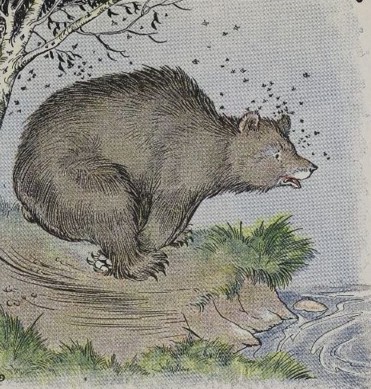PART A_1
Let’s learn vocabulary. Listen and repeat the words and the sentences with your tutor.
PART A_2
| 1. roam | /rohm/ |
| -to move about or travel, especially without a clear idea of what you are going to do | |
| The children were roaming the streets on a hot summer day. | |
| 2. log | /lawg/ |
| -a thick piece of tree trunk or branch, especially one cut for burning on a fire | |
| Burning a log in celebration of Christmas is done in some parts of Europe. | |
| 3. temper | /TEM-per/ |
| -the tendency to become angry very quickly | |
| Everybody avoids her because she has a temper. | |
| 4. injury | /IN-juh-ree/ |
| -physical harm or damage to someone’s body caused by an accident or an attack | |
| The man suffered a mild injury after falling from a tree. | |
| 5. provoke | /pruh-VOHK/ |
| -to cause a reaction, especially a negative one | |
| You should not provoke him when he is angry. |
PART B_1
Let’s read the story. Please read it aloud, and I will check your pronunciation and intonation.
PART B_2
The Bear and the Bees

A Bear roaming the woods in search of berries happened on a fallen tree in which a swarm of Bees had stored their honey.
The Bear began to nose around the log very carefully to find out if the Bees were at home.
Just then one of the swarm came home from the clover field with a load of sweets. Guessing what the Bear was after, the Bee flew at him, stung him sharply and then disappeared into the hollow log.
The Bear lost his temper in an instant, and sprang upon the log tooth and claw, to destroy the nest. But this only brought out the whole swarm.
The poor Bear had to take to his heels, and he was able to save himself only by diving into a pool of water.
It is wiser to bear a single injury in silence than to provoke a thousand by flying into a rage.
PART C_1
Let’s answer comprehension questions. Please answer them based on the story.
PART C_2
| 1. | What happened when the Bear was searching for berries? |
| 2. | Why did the Bee sting the Bear? |
| 3. | How did the Bear react after getting stung? What happened? |
PART D_1
Let’s discuss the story. Please answer the questions below and express your opinions.
PART D_2
| 1. | What makes the fable interesting for you? |
| 2. | How would you describe the Bear? |
| 3. | What do you mean by the saying “It is wiser to bear a single injury in silence than to provoke a thousand by flying into a rage.”? |
| 4. | Have you ever lost your temper? Please tell me more about it. |
| 5. | How can we control our anger? |
REVIEW AND FEEDBACK
Now, let us review the things that you learned in this lesson.
ではこのレッスンで学んだことを振り返りましょう。
(Please give a short feedback on how your student did on your class.)
| Grammar 文法 |
Pronunciation 発音 | Vocabulary 単語 |
Comprehension 理解 |
|
|---|---|---|---|---|
 GOOD GOOD |
文法の誤りはほとんどなく、完全な文章で話すことができる | ほとんどの単語をはっきりと正しく発音することができる | 習った表現を適切に使うことができる | 文章を理解し、質問に正しく答えることができる |
 FAIR |
文法の誤りはあるが、完全な文章で話すことができる | 発音の練習が必要な言葉がいくつかある | たまにミスはあるが、習った表現を適切に使うことができる | 文章を完全に理解するのは難しく、質問に正しく答えられないときもある |
 POOR |
文章で話すのは難しく、単語だけで話すことができる | 発音の練習が必要である | 習った単語と表現を少しだけ使うことができる | 文章を理解するのは難しく、質問に答えるのは難しい |
Parts of this lesson material are based on:
An eBook from The Project Gutenberg.
This eBook is for the use of anyone anywhere at no cost and with almost no restrictions whatsoever. You may copy it, give it away or re-use it under the terms of the Project Gutenberg License included with this eBook or online at www.gutenberg.org
An eBook from The Project Gutenberg.
This eBook is for the use of anyone anywhere at no cost and with almost no restrictions whatsoever. You may copy it, give it away or re-use it under the terms of the Project Gutenberg License included with this eBook or online at www.gutenberg.org